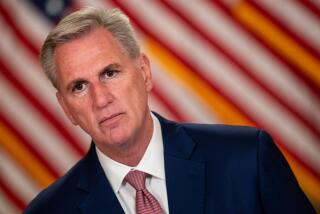Clinton Tells W. Virginians Budget Is ‘Good Beginning’ : Economy: The President says he’s trying to cut through a ‘fog of misinformation’ on the deficit-cutting plan. State picked to dramatize economic needs.
- Share via
CHARLESTON, W. Va. — President Clinton began the arduous task of selling his complex and unpopular deficit-reduction program to the American people in a visit Monday to recession-ravaged West Virginia.
Under the glistening gold-leaf dome of the state Capitol, Clinton attempted to explain the plan through what he called “a withering fog of misinformation” spreading from Washington.
He repeatedly stressed the fairness of the plan to the vast majority of the American people, saying that only 1.2% of Americans--those earning more than $180,000 a year--would pay higher income taxes as a result of the package approved Friday night by Congress.
He did not mention that all Americans will pay higher federal levies on gasoline and that some retirees will pay taxes on a greater proportion of their Social Security benefits.
Aides said that Clinton chose to make his pitch in West Virginia because the demographics of this small, poor state dramatize the impact of his tax plan. According to the latest figures, more than one in eight West Virginia workers--12.9%--are unemployed.
Aides said that only 4,442 families in West Virginia would pay higher incomes taxes under the plan, while 105,000 families here would benefit from an expansion of the earned income tax credit for working families.
“After all, none of us were sent to Washington to keep our jobs,” Clinton said. “We were sent to Washington to help you keep your jobs. And so we have taken, my fellow Americans, a first but major step to regain control of our economic destiny. . . . This is a good beginning.”
Clinton also issued a plea for an end to the bitter partisanship that marked the debate on his budget. The plan passed by only the barest of margins, without a single Republican vote in either chamber of Congress.
The White House strategy throughout the budget battle had been to ignore the Republicans to try to keep wavering Democrats on board through threats and cajolery.
Clinton and his aides know that a purely partisan approach is unlikely to succeed for the rest of his ambitious legislative agenda, including health care reform, revisions in the welfare system and the North American Free Trade Agreement. The trade treaty, in particular, will need Republican votes because organized labor, environmental organizations and other traditionally Democratic constituencies oppose it.
“We need to put an end to the partisan rancor and put the American people first again,” Clinton told a crowd of about 5,000 gathered in the state office complex in downtown Charleston.
“We cannot have every great issue of the day decided on the basis of partisanship, scheduled around the next trip to New Hampshire for a primary still four years away,” Clinton said, in a not-so-subtle dig at Senate Minority Leader Bob Dole (R-Kan.), expected by some to become a GOP presidential candidate in 1996. “We’ve got to do some of these things together.”
In a statement issued from Washington, Dole responded by acknowledging that Americans want bipartisan efforts to resolve the nation’s problems.
“Unfortunately,” he said, “Democrats see bipartisanship as having Republicans just simply sign off on their ideas. This isn’t the kind of cooperation the American people are looking for, and it’s not going to lead to solutions that have the support of both parties and the . . . majority of the American public.”
So far, Dole continued, “the President has only rarely asked for our cooperation and ignored our efforts to help . . . “
In his Charleston speech, The President said that the higher taxes on the wealthy are not designed to “punish success” but to compel those who benefited from the financial boom and lower tax rates of the 1980s to return some of their riches to the public purse.
He also defended the limited new spending in the budget plan as “investments” in the nation’s future. He cited new spending for Head Start, nutrition programs for pregnant women, child immunizations, worker training and college loans as costs that would pay dividends for years to come.
Many in the crowd were government workers granted time off to attend the rally, while others traveled from elsewhere in West Virginia, western Pennsylvania and southern Ohio to hear the President speak.
Clinton was joined on the dais by West Virginia’s Democratic governor, Gaston Caperton, Sen. John D. (Jay) Rockefeller IV and other Democratic members of the state’s congressional delegation. Notably absent was the senior Democratic senator, Robert C. Byrd, who expressed reservations about the President’s budget package but ultimately voted for it.
No explanation for his absence was given by Byrd’s office or the White House.
More to Read
Get the L.A. Times Politics newsletter
Deeply reported insights into legislation, politics and policy from Sacramento, Washington and beyond. In your inbox twice per week.
You may occasionally receive promotional content from the Los Angeles Times.







